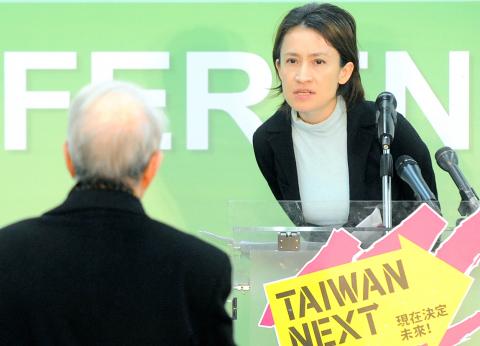Democratic Progressive Party (DPP) presidential candidate Tsai Ing-wen (蔡英文) hopes that her “consensus-building character” and her initiatives would make it possible to foster a stable, long-term relationship with China, as well as ending internal division in Taiwan, the party said yesterday at an international press conference.
About 200 members of the international media and an election observation delegation attended the press conference, held two days before tomorrow’s presidential and legislative elections at the DPP’s national campaign headquarters in Banciao District (板橋), New Taipei City (新北市).
The press conference was hosted by Hsiao Bi-khim (蕭美琴), the director of international affairs at Tsai’s campaign office.

Photo: Wang Yi-sung, Taipei Times
Tsai, who was campaigning in Taoyuan yesterday morning, did not attend the press conference, saying she plans to host a similar press conference after winning the election.
Despite the election being described as the first presidential poll since 1996 not to focus on cross-strait relations, most questions still involved the topic, with reporters asking about Tsai’s “Taiwan consensus” proposal and her grand coalition idea in particular.
On the so-called “1992 consensus” and Tsai’s “Taiwan consensus,” Hsiao said Tsai believes strongly that an internal consensus has to be built to overcome internal divisions in Taiwan before dealing with China, because it would provide consistency in the long-term.
The DPP maintains that the “1992 consensus” is an invented term and “what happened in 1992 was a spirit to agree to disagree,” Hsiao said, adding that even if the consensus exists, it would not be strong enough to sustain the long-term challenges of cross-strait relations.
While Beijing’s preference for Ma is an open secret, the DPP believes China is ready to hedge against a possible Tsai victory because unstable cross-strait relations would be considered a failure of the outgoing Chinese leadership.
The DPP called on Beijing to “realize how democracy works” and try to collaborate with the party on the common interests of the people on both sides of the strait if it wins the election.
Tsai’s consensus-building character and approach would be essential in her handling domestic and external affairs, and her track record is the best proof, Hsiao said.
With her communication skills, the 56-year-old has been able to lead the DPP away from factional in fighting and its humiliating defeat in the 2008 presidential election when she unfiied the party after assuming the chair in 2008, Hsiao said.
Compared with 2000, when the then-DPP administration appointed a Chinese Nationalist Party (KMT) premier, Taiwan’s democracy and its people are now more mature and ready for a change and the end of political division, which is why Tsai asserted that a grand coalition is achievable, Hsiao said.
“Taiwanese are fed up with animosity, exclusion and a winner-takes-all political system,” Hsiao said.
Hsiao outlined Tsai’s campaign theme of “Fairness and Justice” and her major policies, which focus on social and economic issues, such as the distribution of benefits and economic growth in a 20-minute briefing, before moving on to a question-and-answer session.
She raised a number of concerns about the elections — the lack of government neutrality, inappropriate use of state funds and Beijing’s sophisticated interventions.

Palauan President Surangel Whipps Jr arrived in Taiwan last night to kick off his first visit to the country since beginning his second term earlier this year. After arriving at Taoyuan International Airport at around 6:30 pm, Whipps and his delegation were welcomed by Minister of Foreign Affairs Lin Chia-lung (林佳龍). Speaking to gathered media, the Palauan leader said he was excited and honored to be back in Taiwan on his first state visit to Taiwan since he was sworn in this January. Among those traveling with Whipps is Minister of State Gustav N. Aitaro, Public Infrastructure

President William Lai (賴清德) yesterday thanked Palau for its continued support of Taiwan's international participation, as Taipei was once again excluded from the World Health Assembly (WHA) currently taking place in Switzerland. "Palau has never stopped voicing support for Taiwan" in the UN General Assembly, the WHO and other UN-affiliated agencies, Lai said during a bilateral meeting with visiting Palau President Surangel Whipps Jr. "We have been profoundly touched by these endorsements," Lai said, praising the Pacific island nation's firm support as "courageous." Lai's remarks came as Taiwan was excluded for the ninth consecutive year from the WHA, which is being held in

RESOLUTIONS DEBATE: Taiwan’s allies said that UN and WHA resolutions cited by China and other nations ‘do not determine Taiwan’s participation in WHO activities’ A proposal to invite Taiwan to this year’s World Health Assembly (WHA) was rejected on Monday, resulting in Taipei’s absence from the annual meeting for a ninth consecutive year, although partners spoke up for Taiwan’s participation at the first day of the meeting. The first agenda item after the opening was a “two-on-two debate” on a proposal to invite Taiwan to participate at the WHA as an observer. Similar to previous years, two countries made statements in favor of the proposal, while two others expressed their opposition. Philippine Secretary of Health Teodoro Herbosa, president of the 78th WHA, accepted the WHA General Committee’s

At least three people died and more than a dozen were injured yesterday afternoon when a vehicle struck a group of pedestrians in New Taipei City’s Sansia District (三峽). The incident happened at about 4pm when a car rammed into pedestrians at an intersection near Bei Da Elementary School. Witnesses said the sedan, being driven at a high speed, ran a red light, knocking scooters out of the way and hitting students crossing the road before careening into a median near the intersection of Guocheng and Guoguang streets. The incident resulted in three deaths and 13 injuries, including the driver, a 78-year-old man